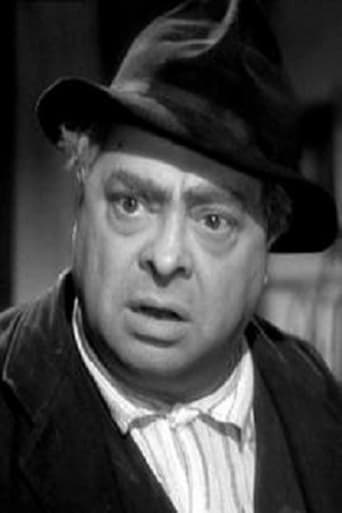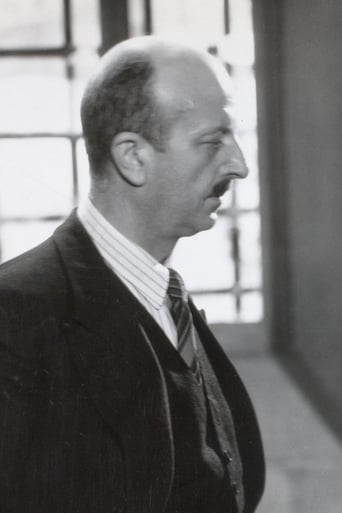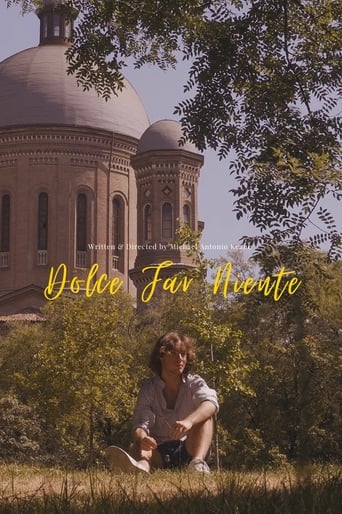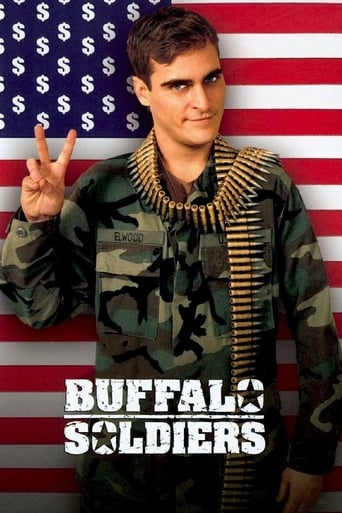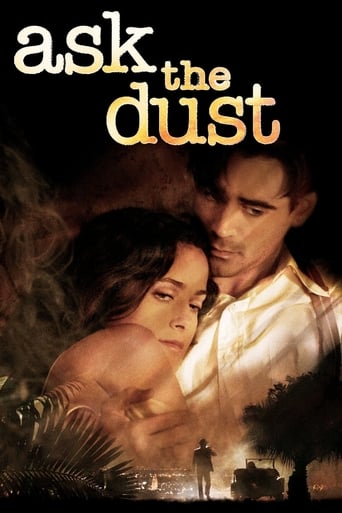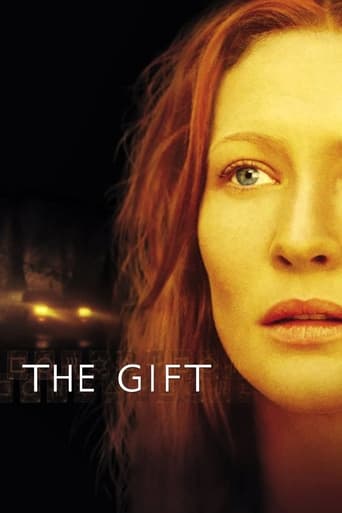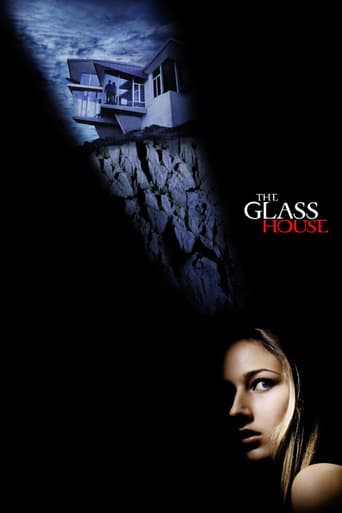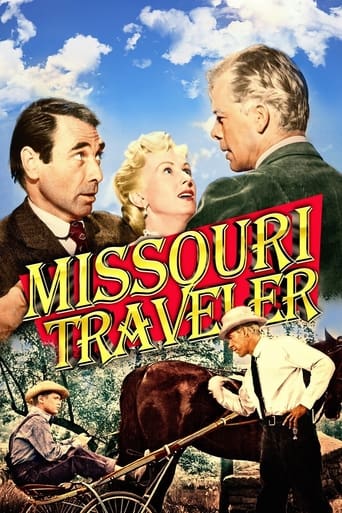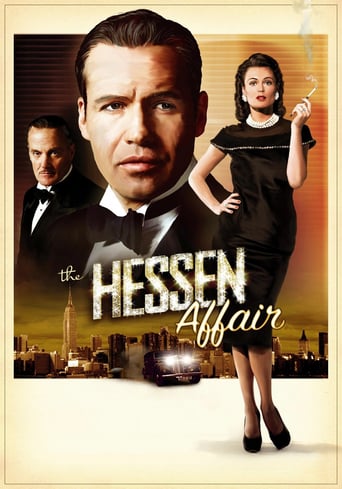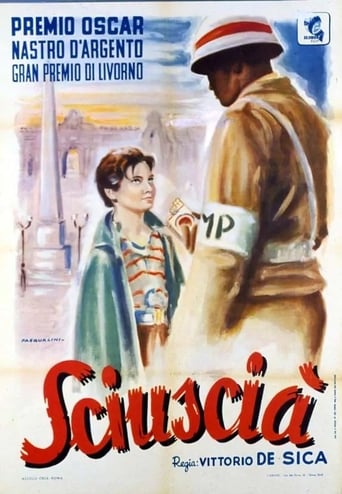
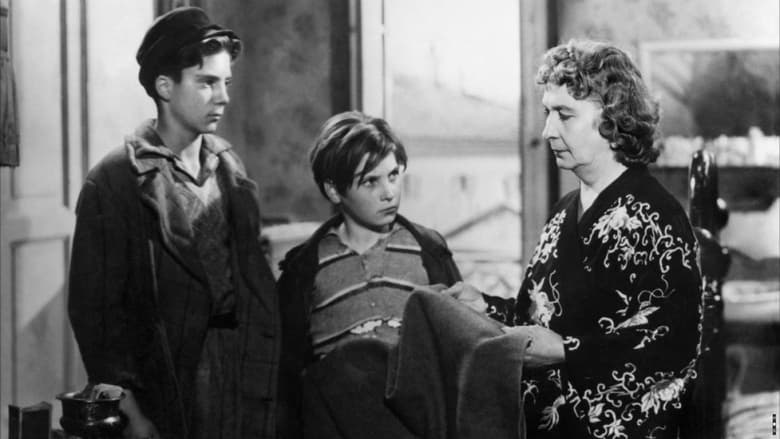
Shoeshine (1947)
At a track near Rome, shoeshine boys are watching horses run. Two of the boys Pasquale, an orphan, and Giuseppe, his younger friend are riding. The pair have been saving to buy a horse of their own to ride...
Watch Trailer
Cast


Similar titles
Reviews
Just two years before Vittorio De Sica changed the world with The Bicycle Thieves (1948), the universally famous actor/director made a small, simple and beautiful movie by the name of Shoeshine (1946). Taking place in war ravaged Italy, the film features the stories of two young shoeshine boys who are tasked with delivering black market goods and get caught in a web of intrigue. Once they are caught by the police, their friendship is challenged when they're sent to an overcrowded boy's penitentiary.The majority of the film takes place in the penitentiary where the two boys (Franco Interlenghi and Rinaldo Smordoni) are separated from each other almost instantly. Forced into separate cells each holding five boys, they become the center of their own maelstroms when one mistakenly betrays the other. I won't ruin the whole picture other than mentioning that the main source of motivation early on is a horse they bought together.The period sets the tone for the film. Despite a bouncy score that highlights every small victory experienced by the characters, the lack of sustenance and poor conditions of life in and out of the penitentiary keeps things gloomy. The boys eat gruel which the warden calls "passable", medical help is slow and ineffective and beds are riddled with lice. Even one of the more kind-hearted superiors finds objection to the state of things. Yet at one point one of the boys calls his new home "paradise" because of its only slightly better living standard than sleeping in an elevator.The film is considered one of the first Italian neorealist works which would leave an indelible mark on Italian cinema and movies worldwide. The form contends with economic hardship and moral denigration as a canvas. Many times they would shoot in and around the streets of Italian cities and even hire non-professional actors to intensify the realism. Often this was for practical reasons. The aftermath of World War Two left the film industry (previously under the close watch of Mussolini) unable to maintain their studios.The Bicycle Thieves stands as the pinnacle of Italian neo-realism but for my money Shoeshine is the better movie. Both stories are quite compelling but from an outsider's perspective, the multiple Italian customs and the research required to understand them are much more-a- plenty in Bicycle Thieves. Additionally the main characters of Shoeshine are children no older than twelve. While in many cases this would be a slight when comparing one movie to another, the actors in Shoeshine act much more authentically to their predicament. There is one scene where the boys trot a horse down the street as the other shoeshine boys either cheer in zeal, or jeer in jealousy. They preen and strut like they're the talk of the town, the belle of the ball, or to put another way; two poor kids with a horse. How can you not smile at that image?There is a famous review of Shoeshine by the famous Pauline Kael where she mentions a " petulant voice of a college girl complaining to her boyfriend, 'well, I don't see what was so special about that movie.'" She then claimed alienation from those who could not experience "the radiance of Shoeshine." In many ways I feel the same about it. If you're not effected by De Sica's first classic then you're not fully human.http://theyservepopcorninhell.blogspot.com/
I am a huge admirer of the films directed by Vittorio De Sica during the 1940s. Using what is referred to as the 'neo-realist' style, he was able to craft many brilliant classics using ordinary folks in ordinary situations. So, without stage-bound sets and professional actors, he was able to make films superior to Hollywood--and among the best films ever. Try watching "The Children Are Watching Us", "Umberto D"or "Miracle in Milan" and you'll see what I am talking about--brilliant and compelling fro start to finish. The only negative about the films is that sometimes they can be incredibly depressing--and that is certainly the case with "Umberto D" and "Shoeshine". Depressing, but also amazing.Like the other neo-realist films, this one stars very ordinary folks--lots of kids--not professionals. Considering how hard it is to get realistic portrayals from kids, he really has to be commended for this. And, like this style of film, it was shot throughout Rome in various locations--not sets. And in the process, De Sica really hit a home run--chronicling a very sad period in Italian history.The film is set in Allied occupied Italy circa 1944. Folks are poor and hungry and jobs are hard to come by. Amidst this poverty, two kids (Pasquale and Guiseppe) are inexplicably saving all the money they can to buy a horse! And so, they take odd jobs, shine shoes and scramble to make a buck. When they are nearing their goal, they are tricked into doing a 'simple' job for Giuseppe's brother--and get arrested for stealing blankets from the Allied forces. Surprisingly, despite their age and how non-serious their crime appeared to be, the two are dealt with VERY harshly and are sent to a god-awful juvenile prison--where starvation and neglect are the norm. Most of the film is set in this awful place and it's a fascinating historical portrait of this period of time in recent history. I could say a lot more about what happens there but I don't want to spoil the surprise. Suffice to say, it's all very tragic--and you might want to have some Kleenex nearby just in case.The biggest strength of the film is the realistic acting by all the kids. You don't get the impression they are acting but that really are kids sent to prison. Also, although this might put some off, the story's insistence that it NOT have a nice happy ending is also a plus. Although I don't want a steady supply of depressing movies, I love that the film was not afraid to be sad in order to tell the story effectively. Well worth seeing and if you enjoy this film, I suggest you then try "The Children Are Watching Us" next--it is, in my opinion, De Sica at his directorial finest.
Honestly speaking I watch movies based on their ratings and IMDb is one site that I rely on (despite the fact that many good movies are underrated; anyway I suppose it is because movies are subjective) and if I find any movie rated 8 and above I would just die to watch them. One of that kind is Vittorio De Sica's The shoeshine and not just because it was rated 8 and above, but also for the movie being a European product.Unlike American movies most of the European movies have close ends rather open ends which make them phenomenal. Now let me tell you why 'The shoeshine' is phenomenal. After having seen the movies Umberto D, Bicycle thief and The Shoeshine(the third movie of De Sica which I watched) it became evident to me that the narrative is spun around the characters (emphasising on the dimensions of the character)where there is a transformation of the character from being vibrant to becoming docile or vice-versa and the like. This can be encountered in all the three movies which I have stated above. Say it be the Father and the son in The Bicycle thief or the old man and the dog in Umberto D or the two boys in The shoeshine. For movie buffs this movie is one gem to archive.
Despite producing all of the requite emotions of sadness, tragedy, and horror you expect from a fine Italian Neorealist film, I can't help but feel that Shoeshine is more staged and thus less effecting than DeSica's greatest works of the period, The Children Are Watching Us and The Bicycle Thieves. There are moments where the plot actually imposes itself on the viewing of the film, where the action takes on a "genre" quality that isn't entirely successful for me.MINOR SPOILERThe escape from the children's prison, for example, feels like it could have been taken from any narrative film and seems out of place in a film whose essential story is about the depths of friendship and the longing for simple pleasures (if you call a horse a simple pleasure) in post-war Italy. The bumbling court and police sequences also seem far too scripted.I suppose my principle problem is the performance by Rinaldo Smordoni as Giuseppe, one of the two shoeshine-boy heroes of the film. He seems much too self-conscious, as if mugging to the camera. Compare this with other child performances in DeSica's films (including Franco Interlenghi's Pasquale in this film) and I think it's clear that there's a decent sized hole in the center of Shoeshine.That being said, the major flaw hardly keeps Shoeshine from being heartbreaking in that "Oh God, since this is Neo-realism, something horrible's bound to be lurking around the corner" way. DeSica was a master at that. He understands that in a war-torn country, sometimes caring too much (like Pasquale, or the kind hearted supervisor of the prison) can be the greatest mistake.The print that I saw, projected and 35 mm, was missing complete subtitles. I think all of the important stuff was translated, but tiny conversations were mostly ignored. I don't suppose this had anything to do with my take on the film, but it's still worth mentioning.Probably still a 7.5/10



